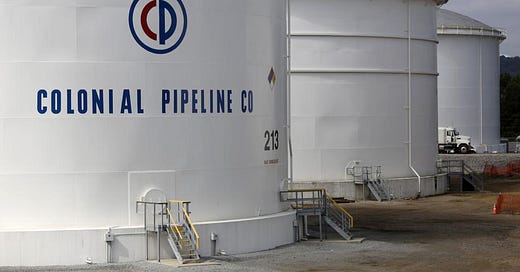Colonial Pipeline Nearly Tripled Lobbying Spending In Q2
Company greatly stepped up lobbying efforts on issues related to cybersecurity and pipeline safety
New lobbying disclosures show Colonial Pipeline spent a total of $190,000 on lobbying fees from April 1 to June 30, nearly three times the amount ($70,000) for the first quarter of the year. Colonial Pipeline has consistently spent $70,000 per quarter on lobbying for over two years, with $40,000 going to Massie Partners, and $30,000 going to K-Street power brokers Williams and Jensen—and while the former's pay remained the same in Q2, the latter saw a 500% increase, with Williams and Jensen being paid $150,000 by Colonial during the time period.
The disclosures show that while Colonial Pipeline Company was dealing with the fallout of May's ransomware attack (and ensuing shutdown)—as well as simultaneously negotiating an accountability-free settlement with the federal government regarding their 1.2+ million gas spill in Huntersville, NC last year—they tasked Williams and Jensen with lobbying Congress and the Federal Energy Regulatory Commission (FERC) and “provide information regarding Colonial Pipeline and its operations and its role in delivering refined products.” The firm also lobbied on “general issues affecting interstate refined product pipelines”. Williams and Jensen was also asked to “Provide information regarding the May 7th ransomware attack, response, and recovery.” and lobby issues on “Energy infrastructure cybersecurity” and more specifically, The Cyber Diplomacy Act of 2021 (H.R. 1251), The Protecting Our Infrastructure of Pipelines and Enhancing Safety Act of 2020 (PIPES Act). The former would establish “the Bureau of International Cyberspace Policy within the Department of State to advise the State Department on cyberspace issues and lead diplomatic efforts on issues related to international cybersecurity, internet access and freedom, and international cyber threats.”, while the latter would give the federal body that regulates oil and gas pipelines, the Pipeline and Hazardous Materials Safety Administration (PHMSA) more teeth when ot comes to enacting rules and disciplining companies who cross the line, as Colonial often has, according to the agency.
The Williams and Jensen team includes firm principals George Baker (who has been with the firm for 40 years), Frank Vlossak, David Franasiak, and Matthew Hoekstra—who, aside from representing Colonial for a while now (other than Baker, who is listed as new on the account), the foursome represent Dell, Oklahoma Gas & Electric, Vanguard Group, Blue Cross, Pfizer, PhRMA, and Visa, to name a few. However, the firm quietly added what could be an important piece to the team during the last few months. That piece comes in the form of Chris Wilcox, who was hired by the firm in 2018. Directly prior to his jump to K Street, Wilcox served as legislative director to Rep. Val Demings from 02/2017 to 08/2018, when he left the position. This connection could be pivotal in Colonial's quest to influence cybersecurity legislation in particular—Demings sits on the House Select Committee on Intelligence, and also on the related Subcommittee on Intelligence Modernization and Readiness. This isn't the first time Colonial has recently been the beneficiary of a well connected addition to their lobbying team—earlier this year, we reported that Sen. Joe Manchin's former senior aide on the Energy snd Natural Resources Committee, Elliot Howard, was hired away from his post by Colonial's other lobbying firm, Massie Partners, who immediately put him to work lobbying his former boss.
Colonial Pipeline, and the massive trade association of which they are members, the American Petroleum Institute, have for years been resistant to new legislation regarding how the industry detects and handles cyber threats—even going so far as calling new propositions “redundant”. To that end, API has reported spending $1,050,000 on in-house lobbying in Q2 on several matters, including cybersecurity legislation. “API member companies believe that the private sector should retain autonomy and the primary responsibility for protecting companies’ assets against cyber-attacks” and “support voluntary collaboration and information sharing between the private sector and governments in order to protect critical infrastructure and the intellectual property of the oil and natural gas industry from cyber-attacks”, their website states. The American Petroleum Institute is the country's largest and most influential trade association for the oil and gas industry, representing nearly 600 companies in the sphere—and speaking for practically all of them.
As pressure mounts in DC for legislation to tighten down on cybersecurity issues, whether directly related to infrastructure like pipelines or not, it wouldn't be a shock if these numbers rise—and not just for Colonial Pipeline or the API. The sentiment shared by the aforementioned groups is one that will likely be shared by many of their corporate peers both in and out of their respective industry. PolitiFi will continue to keep track and report the spending as more information becomes available.




